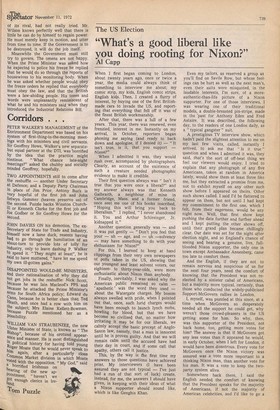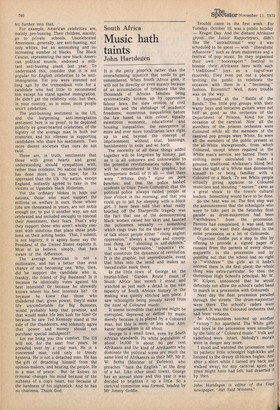The US Election
"What's a good liberal like you doing rooting for Nixon?"
Al Capp
When I first began coming to London, about twenty years ago, once or twice a year, the media could always think of something to interview me about; my comic strip, my kids, English comic strips, English kids. Then, I created a flurry of interest, by buying one of the first Britishmade ears to invade the US, and reporting that everything that fell off it was of the finest British workmanship.
After that, there was a lull of a few years. This year, there was renewed, even frenzied, interest in me. Instantly on my arrival, in October, reporters began phoning me saying (and ready to back down and apologise, if I denied it) — "It isn't true, is it, that you support — Nixon?"
When I admitted it was, they would rush over, accompanied by photographers. Clearly, an account of the existence of such a creature needed photographic evidence to make it credible.
Their first question always was " Isn't it true that you were once a liberal?" and my answer always was that Kenneth Galbraith, a neighbour of mine in Cambridge, Mass. and a former friend, once sent me one of his books inscribed, " Hoping this will bring you back to liberalism." I replied, "I never abandoned it. You and Arthur Schlesinger, Jr. kidnapped it."
Another question generally was — and it was put gently — "Don't you feel that your — uh — age, and — uh —solvency — may have something to do with your enthusiasm for Nixon?"
For this, I learned to keep at hand clippings from their very own newspapers of polls taken in the US, showing that our youngest and least solvent voters, our eighteento thirty-year-olds, were more enthusiastic about Nixon than anybody.
Finally, inevitably, I was asked why the American public remained so calm — ' apathetic ' was the word they used — about the Watergate charges. My bosom always swelled with pride, when I pointed out that, once, suc'h lurid charges would have been enough to launch lynch mobs, howling for blood, but that we have become so civilised that, no matter how irritating it may be for our liberals, we calmly accept the basic precept of AngloSaxon law, namely, that a man is innocent until he is proven guilty. And that we will remain calm until the accused have had their day in court, and if some call that apathy, others call it justice.
This, by the way is the first time my answers to those questions have achieved print. My interviewers (I have been assured they are not typical — I've just had a run of that sort of luck) create,
instead, for me, the answers I should have given, in keeping with their ideas of what a Nixon supporter should sound like, which is like Genghis Khan.
Even my tailors, as reserved a group as you'll find on Savile Row, but whose feelings can be hurt as well as the next man's, even their suits were misquoted, in the laudable interests, I'm sure, of a moreauthentic-than-life picture of a Nixon supporter. For one of those interviews, I was wearing one of their traditional models, a double-breasted pin-stripe, made in the "past for Anthony Eden and Fred Astaire. It was described, the following day, to the readers of one London daily, as a "typical gangster" suit.
A prestigious TV interview show, which hadn't paid the slightest attention to me on my last few visits, called, instantly I arrived, to ask me that "Is it true " question and when I admitted it was, they said, that's the sort of off-beat thing we feel our viewers would enjoy. I tried to explain that any photograph of any five Americans, taken at random in America lately, would show them at least three like me, but they extracted a promise from me, not to exhibit myself on any other such show before I appeared on theirs. Other such shows called. I said I'd be flattered to appear on them, but not until I had kept my commitment to the first one, which I felt, from their eagerness, would be any night now. Well, that first show kept pushing the date further and furt'her ahead and I kept putting the other shows off, until their grand plan became chillingly clear. Our date was set for the night after election night, and so England's chance of seeing and hearing a genuine, live, fullblooded Nixon supporter, the only one in town except Ambassador Annenberg, came too late to comfort them.
And the English, if they are not to remain nervous and suspicious of us for the next four years, need the comfort of knowing that the President was not reelected by a sinister cabal of Americans, but a majority more typical, certainly, than those who conducted the widely-publicised Support-McGovern rallies in London.
I, myself, was puzzled at this since, at a time when McGovern so desperately needed all the support he could get, why weren't those crowd-pleasers in the US getting some for 'him. So why, then, was this supporter of the President, not back home, too, getting more votes for him? The answer is that if McGovern got any less votes than it appeared he would, in early October, when I left for London, it would have been disastrous. Every vote for McGovern once the Nixon victory was assured was a vote more important to a thinking Nixon man, than another vote for his man. It was a vote to keep the twoparty system alive.
Somewhere back there, I said the English needed, the comfort of knowing that the President speaks for the majority of Americans, if not the majority of American celebrities, and I'd like to go a bit further into that.
For example, American celebrities are, mainly, pro-bussing. Their children, mainly, go to private schools. Uncelebrated Americans, generally, are anti-bussing, not only whites, but an astonishing and inincreasing number of blacks. The Black Caucus, representing the new black American political muscle, endorsed a militant anti-bussing plank last year. To understand this, consider that it is not popular for English celebrities to be antiimmigration. Yet you were stunned not long ago by the tremendous vote for a candidate who had little to recommend him except his stand against immigration. He didn't get the celebrity vote, but then, in your country, as in mine, most people aren't celebrities.
The anti-bussing sentiment in the US, and the burgeoning anti-immigration sentiment here is no proof, to be deplored publicly by great-hearted celebrities, of the bigotry of the average man in both our countries, and his vileness in supporting candidates who share his sentiments. Two more decent societies than ours do not exist.
These are, in truth, sentiments that those with great hearts and great understanding should sympathise with, rather than condemn. No nation in history has done more, in less time, for its oppressed than the US. No nation, except England, instantly agreed to take in the victims of Uganda's black Hitlerism.
Yet the ordinary blokes in both our nations, those who must support the millions on welfare in ours, those whose jobs are threatened in yours, are not noble enough (or, to put it another way, are not celebrated and secluded enough) to conceal their resentment, their fears. That's why they support those who aren't wholly content with solutions that place these problems on their aching backs. That, I submit, is not bigotry, it is agony. Some say the President of the United States exploits it. Most of us believe, simply, that heis aware of the difference.
The average American is not a millionaire, and has a better than even chance of not becoming one. Why, then, did 'tie support the candidate who is, frankly, the friend of Big Business? Is it because he idiotically votes against his best interests? Or because he shrewdly knows where his best interests lie? Or because he knew that ' those who thundered that, given power, they'd make life uncomfortable for Big Business, would probably keep that promise, and that would make life less lush for him? Or because he saw Ted Kennedy stand at the side of the thunderers, and solemnly agree that power and money should not purchase special indulgence?
Let me bring you this comfort. The US will not, for the next four years, be presided over by a cold man, He is a concerned man, cold only to trendy hysteria. He is not a detached man. He has the gift of detaching himself from the opinion-makers, and hearing the people. He is a man of peace. But he knows no criminal changes his mind because of the softness of a cop's heart, but because of the hardness of his nightstick. And he has no charisma. Thank God.



















































 Previous page
Previous page